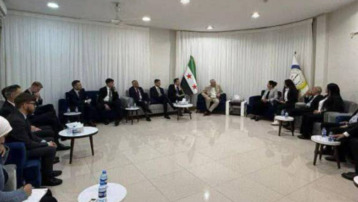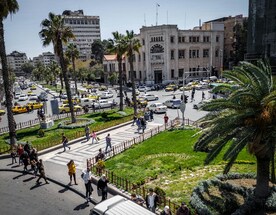-
Iran targets Bitcoin amid blackout, pollution issues

Iran’s capital and major cities plunged into darkness in recent weeks as rolling outages left millions without electricity for hours.
With toxic smog blanketing Tehran skies and the country buckling under the pandemic and other mounting crises, social media has been rife with speculation. Soon, fingers pointed at an unlikely culprit: Bitcoin.
Within days, as frustration spread among residents, the government launched a wide-ranging crackdown on Bitcoin processing centers, which require immense amounts of electricity to power their specialized computers and to keep them cool — a burden on Iran’s power grid.
Authorities shuttered 1,600 centers across the country, including, for the first time, those legally authorized to operate. As the latest in a series of conflicting government moves, the clampdown stirred confusion in the crypto industry — and suspicion that Bitcoin had become a useful scapegoat for the nation’s deeper-rooted problems.
 Cars drive on an unlit street during a blackout in Tehran, Iran, Wednesday, Jan 20, 2021. (AP)
Cars drive on an unlit street during a blackout in Tehran, Iran, Wednesday, Jan 20, 2021. (AP)Since former President Donald Trump unilaterally withdrew in 2018 from Tehran’s nuclear accord with world powers and re-imposed sanctions on Iran, cryptocurrency has surged in popularity in the Islamic Republic.
For Iran, anonymous online transactions made in cryptocurrencies allow individuals and companies to bypass banking sanctions that have crippled the economy. Bitcoin offers an alternative to cash printed by sovereign governments and central banks — and in the case of Iran and other countries under sanctions like Venezuela, a more stable place to park money than the local currency.
Iran’s generously subsidized electricity has put the country on the crypto-mining map, given the operation’s enormous electricity consumption. Electricity goes for around 4 cents per kilowatt-hour in Iran, compared to an average of 13 cents in the United States.
Iran is among the top 10 countries with the most Bitcoin mining capacity in the world — 450 megawatts a day. The US network has a daily capacity of more than 1,100 megawatts.
Across the country, windowless warehouses hum with heavy industrial machinery and rows of computers that crunch highly complex algorithms to verify transactions. The transactions, called blocks, are then added to a public record, known as the blockchain.
“Miners” adding a new block to the blockchain collect fees in bitcoins, a key advantage amid the country’s currency collapse. Iran’s rial, which had been trading at 32,000 to the dollar at the time of the 2015 nuclear deal, has tumbled to around 240,000 to the dollar these days.
 Air pollution blankets the skyline in Tehran, Iran. (AP)
Air pollution blankets the skyline in Tehran, Iran. (AP)Iran’s government has sent mixed messages about Bitcoin. On one hand, it wants to capitalize on the soaring popularity of digital currency and sees value in legitimizing transactions that fly under Washington’s radar. It authorized 24 Bitcoin processing centers that consume an estimated 300 megawatts of energy a day, attracted tech-savvy Chinese entrepreneurs to tax-free zones in the country’s south and permitted imports of computers for mining.
Amir Nazemi, deputy minister of telecommunications and information, declared last week that cryptocurrency “can be helpful” as Iran struggles to cope with sanctions on its oil sector.
On the other hand, the government worries about limiting how much money is sent abroad and controlling money laundering, drug sales and internet criminal groups.
Iranian cryptocurrency miners have been known to use ransomware in sophisticated cyber-attacks. On Thursday, British cybersecurity firm Sophos reported it found evidence tying crypto-miners in Iran’s southern city of Shiraz to malware that was secretly seizing control of thousands of Microsoft servers.
Iran is now going after unauthorized Bitcoin farms with frequent police raids. Those who gain authorization to process cryptocurrency are subject to electricity tariffs, which miners complain discourage investment.
“Activities in the field are not feasible because of electricity tariffs,” said Mohammad Reza Sharafi, head of the country’s Cryptocurrency Farms Association. Despite the government giving permits to 1,000 investors, only a couple dozen server farms are active, he added, because tariffs mean Bitcoin farms pay five times as much for electricity as steel mills and other industries that consume far more power.
A video showing industrial computers whirring away at a massive Chinese cryptocurrency farm spread online like wildfire, prompting outrage about Bitcoin’s outsized thirst for electricity. Within days, the government closed that plant despite its authorization to operate.
“The priority is with households, commercial, hospitals and sensitive places,” said Mostfa Rajabi Mashhadi, spokesman of Iran’s electricity supply department, noting that illegal farms sucked up daily some 260 megawatts of electricity.
Although Bitcoin mining strains the power grid, experts say it’s not the real reason behind Iran’s electricity outages and dangerous air pollution. The telecommunications ministry estimates that Bitcoin consumes less than 2 percent of Iran’s total energy production.
“Bitcoin was an easy victim here,” said Kaveh Madani, a former deputy head of Iran’s Department of Environment, adding that “decades of mismanagement” have left a growing gap between Iran’s energy supply and demand.
Authorities reported that households have increased their heating gas usage by 8 percent this year, which Tehran’s electric supply company said led to “limitations in feeding the country’s power plants and a lack of electricity.”
source: The Associated Press
Image source: AP
Levant
You May Also Like
Popular Posts
Caricature
BENEFIT AGM approves 10%...
- March 27, 2025
BENEFIT, the Kingdom’s innovator and leading company in Fintech and electronic financial transactions service, held its Annual General Meeting (AGM) at the company’s headquarters in the Seef District.
During the meeting, shareholders approved all items listed on the agenda, including the ratification of the minutes of the previous AGM held on 26 March 2024. The session reviewed and approved the Board’s Annual Report on the company’s activities and financial performance for the fiscal year ended 31 December 2024, and the shareholders expressed their satisfaction with the company’s operational and financial results during the reporting period.
The meeting also reviewed the Independent External Auditor’s Report on the company’s consolidated financial statements for the year ended 31 December 2024. Subsequently, the shareholders approved the audited financial statements for the fiscal year. Based on the Board’s recommendation, the shareholders approved the distribution of a cash dividend equivalent to 10% of the paid-up share capital.
Furthermore, the shareholders endorsed the allocation of a total amount of BD 172,500 as remuneration to the members of the Board for the year ended 31 December 2024, subject to prior clearance by related authorities.
The extension of the current composition of the Board was approved, which includes ten members and one CBB observer, for a further six-month term, expiring in September 2025, pending no objection from the CBB.
The meeting reviewed and approved the Corporate Governance Report for 2024, which affirmed the company’s full compliance with the corporate governance directives issued by the CBB and other applicable regulatory frameworks. The AGM absolved the Board Members of liability for any of their actions during the year ending on 31st December 2024, in accordance with the Commercial Companies Law.
In alignment with regulatory requirements, the session approved the reappointment of Ernst & Young (EY) as the company’s External Auditors for the fiscal year 2025, covering both the parent company and its subsidiaries—Sinnad and Bahrain FinTech Bay. The Board was authorised to determine the external auditors’ professional fees, subject to approval from the CBB, and the meeting concluded with a discussion of any additional issues as per Article (207) of the Commercial Companies Law.
Speaking on the company’s performance, Mr. Mohamed Al Bastaki, Chairman BENEFIT , stated: “In terms of the financial results for 2024, I am pleased to say that the year gone by has also been proved to be a success in delivering tangible results. Growth rate for 2024 was 19 per cent. Revenue for the year was BD 17 M (US$ 45.3 Million) and net profit was 2 Million ($ 5.3 Million).
Mr. Al Bastaki also announced that the Board had formally adopted a new three-year strategic roadmap to commence in 2025. The strategy encompasses a phased international expansion, optimisation of internal operations, enhanced revenue diversification, long-term sustainability initiatives, and the advancement of innovation and digital transformation initiatives across all service lines.
“I extend my sincere appreciation to the CBB for its continued support of BENEFIT and its pivotal role in fostering a stable and progressive regulatory environment for the Kingdom’s banking and financial sector—an environment that has significantly reinforced Bahrain’s standing as a leading financial hub in the region,” said Mr. Al Bastaki. “I would also like to thank our partner banks and valued customers for their trust, and our shareholders for their ongoing encouragement. The achievements of 2024 set a strong precedent, and I am confident they will serve as a foundation for yet another successful and impactful year ahead.”
Chief Executive of BENEFIT; Mr. Abdulwahed AlJanahi commented, “The year 2024 represented another pivotal chapter in BENEFIT ’s evolution. We achieved substantial progress in advancing our digital strategy across multiple sectors, while reinforcing our long-term commitment to the development of Bahrain’s financial services and payments landscape. Throughout the year, we remained firmly aligned with our objective of delivering measurable value to our shareholders, strategic partners, and customers. At the same time, we continued to play an active role in enabling Bahrain’s digital economy by introducing innovative solutions and service enhancements that directly address market needs and future opportunities.”
Mr. AlJanahi affirmed that BENEFIT has successfully developed a robust and well-integrated payment network that connects individuals and businesses across Bahrain, accelerating the adoption of emerging technologies in the banking and financial services sector and reinforcing Bahrain’s position as a growing fintech hub, and added, “Our achievements of the past year reflect a long-term vision to establish a resilient electronic payment infrastructure that supports the Kingdom’s digital economy. Key developments in 2024 included the implementation of central authentication for open banking via BENEFIT Pay”
Mr. AlJanahi concluded by thanking the Board for its strategic direction, the company’s staff for their continued dedication, and the Central Bank of Bahrain, member banks, and shareholders for their valuable partnership and confidence in the company’s long-term vision.
opinion
Report
ads
Newsletter
Subscribe to our mailing list to get the new updates!






















